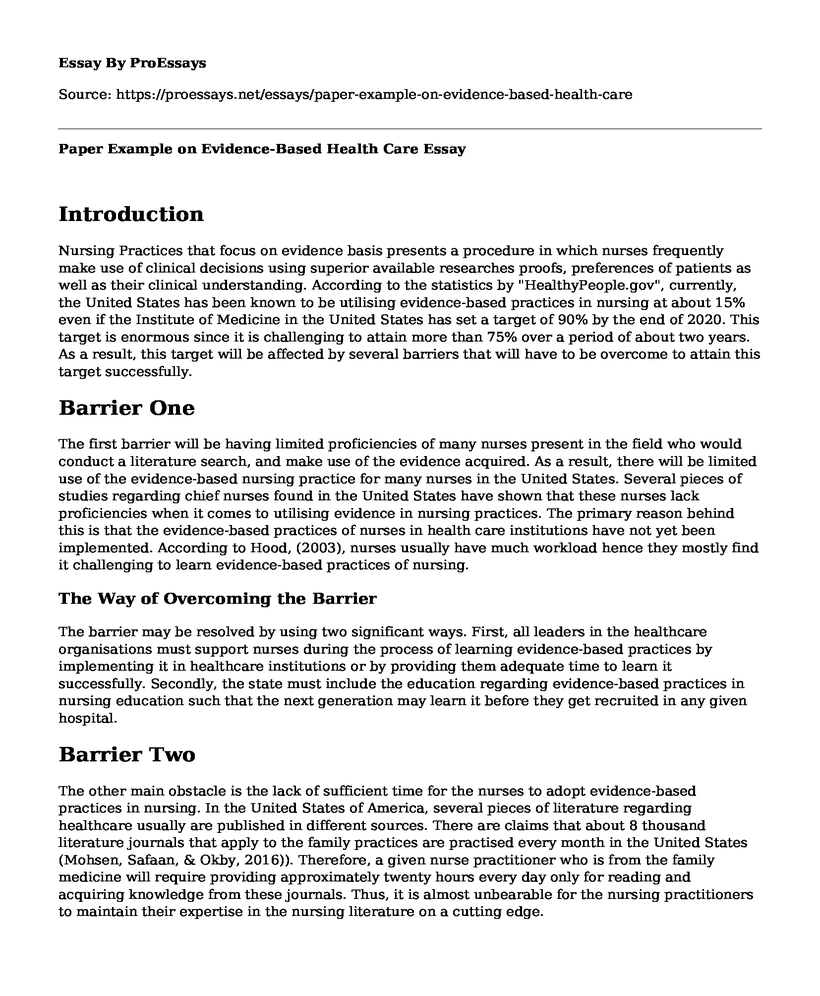Introduction
Nursing Practices that focus on evidence basis presents a procedure in which nurses frequently make use of clinical decisions using superior available researches proofs, preferences of patients as well as their clinical understanding. According to the statistics by "HealthyPeople.gov", currently, the United States has been known to be utilising evidence-based practices in nursing at about 15% even if the Institute of Medicine in the United States has set a target of 90% by the end of 2020. This target is enormous since it is challenging to attain more than 75% over a period of about two years. As a result, this target will be affected by several barriers that will have to be overcome to attain this target successfully.
Barrier One
The first barrier will be having limited proficiencies of many nurses present in the field who would conduct a literature search, and make use of the evidence acquired. As a result, there will be limited use of the evidence-based nursing practice for many nurses in the United States. Several pieces of studies regarding chief nurses found in the United States have shown that these nurses lack proficiencies when it comes to utilising evidence in nursing practices. The primary reason behind this is that the evidence-based practices of nurses in health care institutions have not yet been implemented. According to Hood, (2003), nurses usually have much workload hence they mostly find it challenging to learn evidence-based practices of nursing.
The Way of Overcoming the Barrier
The barrier may be resolved by using two significant ways. First, all leaders in the healthcare organisations must support nurses during the process of learning evidence-based practices by implementing it in healthcare institutions or by providing them adequate time to learn it successfully. Secondly, the state must include the education regarding evidence-based practices in nursing education such that the next generation may learn it before they get recruited in any given hospital.
Barrier Two
The other main obstacle is the lack of sufficient time for the nurses to adopt evidence-based practices in nursing. In the United States of America, several pieces of literature regarding healthcare usually are published in different sources. There are claims that about 8 thousand literature journals that apply to the family practices are practised every month in the United States (Mohsen, Safaan, & Okby, 2016)). Therefore, a given nurse practitioner who is from the family medicine will require providing approximately twenty hours every day only for reading and acquiring knowledge from these journals. Thus, it is almost unbearable for the nursing practitioners to maintain their expertise in the nursing literature on a cutting edge.
A Way of Overcoming the Barrier
The barrier to the lack of sufficient time to adapt to the evidence-based practices may be resolved by having leadership support. All of the nursing practitioners must be required to carry out an assessment to identify evidence present in the problem or circumstances that the patients are experiencing. This does not mean that the nursing practitioners are required to critically read every published literature since it will be challenging for them. According to Biss, (2016), all nurses must be guided by their leaders in the finding of suitable proof in clinical circumstances and ways of utilising the newly found evidence. As a result, this will promote not only the knowledge of the nurses but also their expertise. Furthermore, another implication of having leadership support in the healthcare system is that nursing practices that are evidence-based will assist the hospitals in acquiring the patients' trust in the provided treatments.
References
Biss, M. (2016). Evidence-based health care: the care you want, but might not be getting. Retrieved from news.osu.edu: https://news.osu.edu/news/2016/02/01/evidence/
Hood, P. D. (2003). Scientific research and evidence-based practice. San Francisco: WestEd. Retrieved from: https://www.wested.org/online_pubs/scientrific.research.pdf
Mohsen, M. M., Safaan, N. A., & Okby, O. M. (2016). Nurses' perceptions and barriers for adoption of evidence-based practice in primary care: Bridging the gap. Am J Nurs Res, 4(2), 25-33.Retrieved from pubs.sciepub.com: http://pubs.sciepub.com/ajnr/4/2/1/
Cite this page
Paper Example on Evidence-Based Health Care. (2022, Jul 08). Retrieved from https://proessays.net/essays/paper-example-on-evidence-based-health-care
If you are the original author of this essay and no longer wish to have it published on the ProEssays website, please click below to request its removal:
- Obesity and Diabetes Research Paper Example
- Essay Sample on Safety Practice in Correctional Nursing
- Essay Sample on 3 Best Weight Loss Programs: WW, Noom, Mayo Clinic
- Essay Example on Canada's Division 8 FDR: Regulating New Drugs for Safety & Quality
- Essay on Nurse Qualification Impact: Burnout & Career Change?
- Essay Sample on Psychosocial Factors: Influence on Health & Disease
- 12 Environmental "Time-Bombs" Requiring Immediate Attention Paper Example







